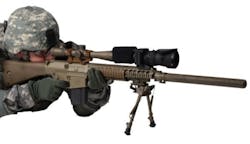DARPA to brief industry on project to harness biology to manufacture military devices and materials
ARLINGTON, Va., 9 June 2011. Scientists from the U.S. Defense Advanced Research Projects Agency (DARPA) in Arlington, Va., will brief industry on a new project to harness biology as a manufacturing technology to for on-demand production of new and high-value materials, devices, and capabilities for aerospace and defense applications.The DARPA initiative, the Living Foundries program, seeks to use biological production to create a rapid, reliable manufacturing capability in which scientists could fabricate several cellular functions under control of integrated circuitry. Briefings to industry will be from 8:30 to 5 p.m. on 28 June at the Capitol Conference Center, 3601 Wilson Blvd., in Arlington, Va.
The science of engineering biology today is primitive, DARPA officials explain. The current practice relies on an ad hoc, laborious, trial-and-error process that yields little benefit to subsequent efforts to use or improve the technology. Scientists today can modify only a small set of genes to build simple, isolated, and generic circuits and metabolic pathways.
As a result, researchers are limited to producing only a small fraction of possible chemicals, materials, and living systems that they could if they had a deep capability to engineer biology, DARPA officials say. The Living Foundries project seeks to develop new tools and technologies to transform biology into an engineering practice, separate design from fabrication, and speed the biological design, build, and test cycle.
DARPA scientists are interested in developing design tools ranging from high-level description to fabrication in cells; ways to develop and fine-tune genetic parts and systems; cell-like systems able to integrate new genetic designs; DNA synthesis and assembly techniques; as well as design and debugging tools.
Industry briefings will introduce industry, academia, and government to the Living Foundries vision and goals; encourage research teaming arrangements; and help investigators talk among themselves about new ideas. Closed-door sessions to give presentations to government personnel will be available. Participation is free.
Those interested in attending the Living Foundries industry day briefings should register online no later than 21 June at https://safe.sysplan.com/mto/livingfoundries. No on-site registration will be available. DARPA should issue a formal broad agency announcement for the Living Foundries program before 28 June.
E-mail questions or concerns about the Living Foundries industry briefings to DARPA's Alicia Jackson at [email protected] with "Living Foundries Industry Day" in the subject line.
More information is online at https://www.fbo.gov/spg/ODA/DARPA/CMO/DARPA-SN-11-44 /listing.html.

John Keller | Editor
John Keller is editor-in-chief of Military & Aerospace Electronics magazine, which provides extensive coverage and analysis of enabling electronic and optoelectronic technologies in military, space, and commercial aviation applications. A member of the Military & Aerospace Electronics staff since the magazine's founding in 1989, Mr. Keller took over as chief editor in 1995.

